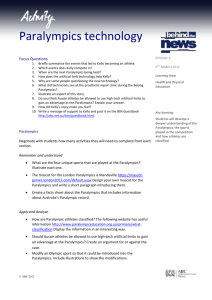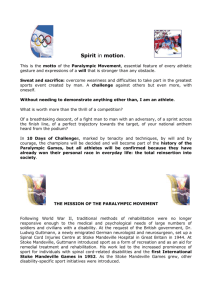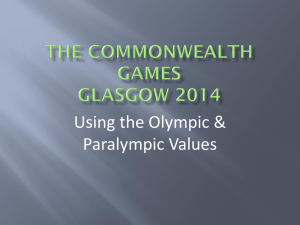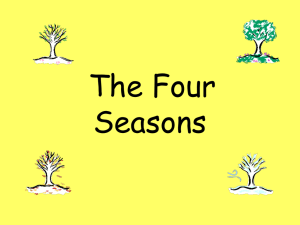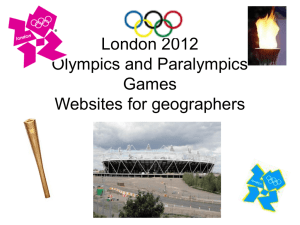The Paralympic Games
advertisement
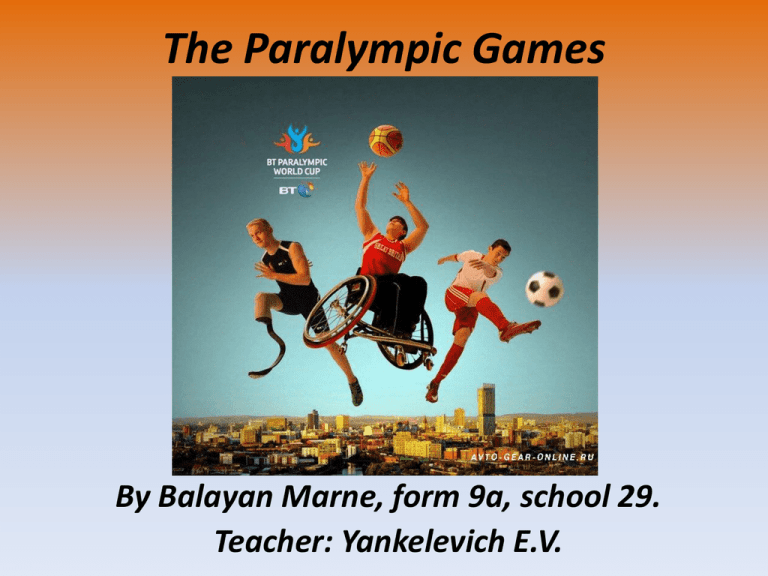
The Paralympic Games By Balayan Marne, form 9a, school 29. Teacher: Yankelevich E.V. The Paralympic Games is a major international multi-sport event, involving athletes with a range of physical and intellectual disabilities, including mobility disabilities, amputations, blindness, and cerebral palsy. Blindness Cerebral palsy Mobility disabilities Amputations The origins of the Paralympic Games are credited to neurologist and neurosurgeon, Professor Ludwig Guttmann. The Second World War influenced a new outlook on the issue of rehabilitation for people with disabilities. In 1944, Professor Guttmann founded a medical center at Stoke-Mandeville Hospital (UK) for the treatment of people with spinal cord injuries. Later, he became a founder of the International Stoke-Mandeville games for people with injuries of the locomotor apparatus. These games were the prototype for the Paralympic Games. Paralympics emblem is different from the traditional Olympics; it has three half-circles that represent the spirit, will and mind. There have been several milestones in the Paralympic movement. The first official Paralympic Games were held in Rome in 1960. 400 athletes from 23 countries competed at the 1960 Games. Since 1960, the Paralympic Games have taken place in the same year as the Olympic Games. The Games were initially open only to athletes in wheelchairs; at the 1976 Summer Games, athletes with different disabilities were included for the first time at a Summer Paralympics. With the inclusion of more disability classifications the 1976 Summer Games expanded to 1,600 athletes from 40 countries. The 1988 Summer Paralympics in Seoul, South Korea, was another milestone for the Paralympic movement. It was in Seoul that the Paralympic Summer Games were held directly after the Olympic Summer Games, in the same host city, and using the same facilities. This set a precedent that was followed in 1992, 1996 and 2000. It was eventually formalized in an agreement between the International Paralympic Committee (IPC) and the International Olympic Committee (IOC) in 2001, and was recently extended through 2020. There are Summer Paralympic Games, which since the 1988 Summer Games in Seoul, South Korea, are held immediately following the Olympic Games 1960 I Summer Paralympics Rome, Italy 1964 II Summer Paralympics Tokyo, Japan 1968 III Summer Paralympics Tel Aviv, Israel 1972 IV Summer Paralympics Heidelberg, West Germany 1976 V Summer Paralympics Toronto, Canada 1980 VI Summer Paralympics Arnhem, Netherlands 1984 VII Summer Paralympics Stoke Mandeville, UK,New York, The USA 1988 VIII Summer Paralympics Seoul, Republic of Korea 1992 IX Summer Paralympics Barcelona and Madrid,Spain 1996 X Summer Paralympics Atlanta, United States 2000 XI Summer Paralympics Sydney, Australia 2004 XII Summer Paralympics Athens, Greece 2008 XIII Summer Paralympics Beijing, China 2012 XIV Summer Paralympics London, United Kingdom The first Winter Paralympic Games were held in 1976 in Örnsköldsvik, Sweden. This was the first Paralympics in which multiple categories of athletes with disabilities could compete. The Winter Games were celebrated every four years on the same year as their summer counterpart, just as the Olympics were. This tradition was upheld until the 1992 Games in Albertville, France; after that, beginning with the 1994 Games, the Winter Paralympics and the Winter Olympics have been held in those even numbered years separate from the Summer Games. Winter Paralympic Games • • • • • • • • • • • 1976 I Winter Paralympics Örnsköldsvik, Sweden 1980 II Winter Paralympics Geilo, Norway 1984 III Winter Paralympics Innsbruck, Austria 1988IV Winter Paralympics Innsbruck, Austria 1992 V Winter Paralympics Tignes & Albertville, France 1994 VI Winter Paralympics Lillehammer, Norway 1998 VII Winter Paralympics Nagano, Japan 2002 VIII Winter Paralympics Salt Lake City, United States 2006 IX Winter Paralympics Turin, Italy 2010 X Winter Paralympics Vancouver, Canada 2014 XI Winter Paralympics Sochi, Russia There are twenty Paralympic sports on the Summer Paralympic program and there are five Paralympic sports on the Winter Paralympics program. Within some of the sports are several events. For example, alpine skiing has a slalom and giant slalom. All Paralympic Games are governed by the International Paralympic Committee (IPC). It comprises 174 National Paralympic Committees (NPC) and four disability-specific international sports federations. The president of the IPC is Philip Craven, a former Paralympian from Great Britain. In his capacity as head of the IPC, Craven is also a member of the International Olympic Committee. The IPC's international headquarters are in Bonn, Germany. The IPC is responsible for organizing the Summer and Winter Paralympic Games. The president of the IPC is Philip Craven, a former Paralympian from Great Britain. Irek Zaripov Ayratovich-Russian sportsman, Merited Master of Sports of Russia, four-time champion of the Paralympics Winter Games in 2010 in Vancouver. Dmitry Medvedev and Irek Zaripov on the Order "For Services to the Fatherland» IV degree Order "For Services to the Fatherland» IV degree (26 March 2010) - for outstanding contribution to the development of physical culture and sports, high athletic achievements at the X Paralympics Winter Games 2010 in Vancouver (Canada) Maria Iovleva - double Paralympics champion and silver medalist Paralympics Winter Games 2010 in Vancouver. Honored Master of Sports of Russia. Anna Milenina (Burmistrov) (born July 15, 1986, Krasnoturinsk, Sverdlovsk Oblast, RSFSR, USSR) - a Paralympics champion, Merited Master of Sports of Russia. Sergey V. Shilov - six-time champion of the Paralympics Games, the four-time European champion and a winner of the World Cup ski racing, a winner of the continental championship in athletics. Honored Master of Sports of Russia in skiing, worldclass athlete in biathlon, world-class athlete in track and field, a candidate master of orienteering. Paralympic medals. For many years Russia had no impediment – free environment. Stairways, lifts and doors – all these were designed as if the country didn’t have people with disabilities. The situation is changing dramatically thanks to the Sochi Games. Russia has a unique opportunity to integrate people with disabilities into the life of society. Transport, roads, sports and social infrastructure will provide a model for an impediment-free environment for the whole country. Paralympic sport, the Paralympic movement have more important goals: to change society’s attitude towards people with disabilities. See you in Sochi in 2014…
